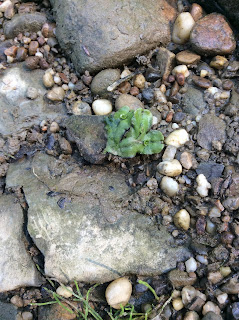Specimen #9: Conocephalum concium, Snake Liverwort
Figure 1: Conocephalum concium on
its original substrate. This thallose liverwort was found on a rocky wall.
Figure 2:
Thallus of Conocephalum concium at a
scale of 20 um. Left-hand is the top side and right-hand is the underside. Notice its distinct polygonal areas and dichotomous branching, meaning it branches into two. Also, notice that there are no marginal scales on the underside of the thallus. The
rhizoid, which are root-like in structure, are visible in the right-hand
picture.
Name: Conocephalum
concium
Common Name: Snake Liverwort
Family: Conocephalaceae
Collection Date: September
22, 2016
Habitat: Moist
rocks and soil, widespread in North America.
Location: On
a rocky wall in Squaw Rock in South Chagrin Nature Preserve in Solon, Ohio.
Description: Thalli
pale to dark green above, purplish below, 1-2 cm wide, up to 20 cm long,
dichotomously branching, upper surface with distinct polygonal areas, pores
distinct.
Key Used:
Conard, H.S. and P.L. Redfern, Jr. 1979. How
to Know the Mosses and Liverworts 2nd Edition, McGraw Hill,
Boston Massachusetts.
Keying Steps:
Class II. Hepaticae – The Liverworts, p. 232
Order 6: Marchantiales, p. 239
1a. Air pores visible
without lens, each in a polygonal area…..8
8b. Thalli without
gemmae, and without marginal scales on underside….10
10a. Air pore on a low
mound od colorless cells….(p. 283) Conocephalaceae
Specimen #10: Marchantia polymorpha, Umbrella Liverwort
Figure 1: Left-hand
picture is Marchantia polymorpha on
its original substrate. This
specimen was found on a rocky shoreline of a running river. The right-picture
is a close-up of the specimen. Notice the gemmae cups which are the asexually
reproductive structures of a liverwort like this one.
Figure 2: Marchantia
polymorpha at a scale of 20 um. The left-hand picture is the underside of Marchantia polymorpha. Notice the purplish
tinge to parts of the thallus as well as the hair-like rhizoids which are used
to collect nutrients from the soil and attach it to its substrate. The middle
picture is an up-close look at the thallus with its elliptical air pores. The
right-hand picture is the gemmae cup with papillae, the "teeth", on its edges. The small ovals within are the gemmae.
Name: Marchantia polymorpha
Common Name: Umbrella Liverwort
Family: Marchantiaceae
Collection Date: September
22, 2016
Habitat: On
damp soil, rocks, along streams, in gardens and greenhouses and on burned over
areas, throughout North America.
Location: On
a rock on a rocky shoreline of a running river in Squaw Rock in South Chagrin
Nature Preserve in Solon, Ohio.
Description: Thalli
4-6 cm long, pale to dark green, often purplish below, pores barrel-shaped,
gemmae cups round, male and female receptacles umbrella-like.
Key Used:
Conard, H.S. and P.L. Redfern, Jr. 1979. How
to Know the Mosses and Liverworts 2nd Edition, McGraw Hill,
Boston Massachusetts.
Keying Steps:
Class II. Hepaticae – The Liverworts, p. 232
Order 6: Marchantiales, p. 239:
1a. Air pores visible
without lens, each in a polygonal area…..8
8a. Thalli with open of
half-cups of dish-shaped gemmae on the thallus….9
9a. Gemmae cups round,
fringed; thalli with thin scales along the margin beneath; air pores elliptic…(p.284)
Marchantia
Marchantia, p. 284:
1a. Gemmae cups with
surface papillae…Marchantia polymorpha L.








I am loving the pictures!
ReplyDelete